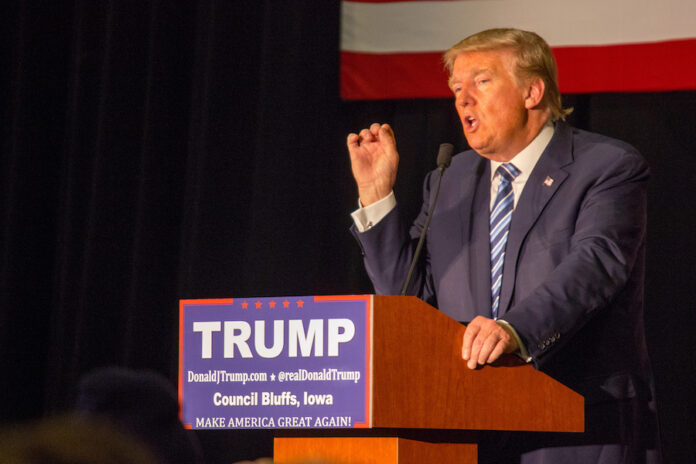These distortions of narrative give a disadvantage to Mueller, who is bringing facts to a PR fight
America’s inability to agree on the seriousness of Trump’s ties to the Russian government stems from one thing: that the American media and public have simultaneously never and always been right about Trump’s motivations for running for president.
After Trump first declared his candidacy three-and-a-half years ago, the general consensus was that he wasn’t actually serious about wanting to be president. He couldn’t be serious. Most people thought it couldn’t be more than a publicity or marketing stunt, a ploy for the Trump brand to get free advertising from every media outlet.
In the beginning, this narrative prevailed in the political and media establishments, both left and right. This narrative isolates Trump’s personal business interests and, more generally speaking, his narcissism, as the central motivations of his presidential bid. Yet, as Trump began winning polls, primaries and eventually, the Republican nomination, this original narrative shifted almost entirely to the narrative that he was indeed serious about the whole wanting-to-be-president thing, and that he should be treated accordingly.
However, the media’s desire for simplistic narratives and its inclination to shed “unnecessary” nuance caused the original narrative to be virtually abandoned, leading many to deduce that the narratives of “businessman Trump” and “public servant Trump” are mutually exclusive. They aren’t. Both have always been true, and America’s incapacity to perceive both simultaneously is having dangerous ramifications. On a side note, it is quite ironic that in abandoning the narrative of “businessman Trump” with respect to his own personal business dealings, many still said that they wanted someone who could “run the country like a business.”
While the original narrative allowed people to take Trump less seriously, to underestimate him and to feel disconnected from him, the second narrative eliminates Trump’s narcissistic, self-serving nature. Viewing Trump as a serious candidate helped fuel the notion that he was being selfless by walking away from his business (he didn’t actually fully divest from his businesses, hence the emoluments clause lawsuit). This narrative allows one to frame his decision to run for president as a sort of “community service” for America. On the campaign trail, he frequently said things to the effect of, “I don’t have to be running,” “I’m losing a lot of money doing this,” and “I’m leaving a great life to do this because I love America.”
Trump’s supporters seem fully convinced by both this and Trump’s 2017 declaration that Special Counsel Robert Mueller would be crossing a “red line” by investigating Trump’s business dealings and finances. Mueller crossed that line. Trumpers didn’t like it.
I’ve had interesting arguments with people who agree that Mueller has no jurisdiction to look into Trump’s finances. They’ve said that Trump’s businesses are in no way related to his presidential campaign, that Mueller is grasping at straws by looking at Trump’s finances and that Trump shouldn’t have to disclose his tax returns, those are ‘deeply personal’ documents.
Many people who subscribe to what I’ve been referring to as the “second” narrative don’t think it’s possible that Trump’s businesses could have any connection to the Campaign’s alleged collusion with the Russian government.
Yet, we know that Trump pursued a deal to build Trump Tower Moscow through at least June 2016, despite saying that he didn’t. We know that he signed a letter of intent in October 2015 to move forward with Trump Tower Moscow. We know that in November 2015, Trump’s former consigliere Michael Cohen was in contact with a Russian operative who offered “political synergy” and “synergy on a government level.” We know that the idea of giving the penthouse to Russian President Vladimir Putin was floated. We know that all of these things were lied about over the course of the presidential campaign, leaving Trump at risk of being compromised by the Russian government.
Given this evidence, it’s probable that Trump was running as neither a PR stunt nor as a serious presidential candidate — rather, he was running a serious PR stunt to advance his businesses. If you eliminate Trump’s business interests as a potential motivator, it makes it easier to say that collusion didn’t happen or that it isn’t even a crime. But in reality, collusion is just a soft word for conspiracy to defraud the United States of America, which is a crime.
Perhaps the primary goal of Trump’s presidential campaign was to lend prestige to his brand during the Trump Tower Moscow negotiations. This supports the theories that Trump never thought he’d actually win the election and that his campaign as a whole may have just been a fraud, a ruse, a manipulation of the American people that could finally turn his decades-long dream of Trump Tower Moscow into a reality.
With Mueller’s investigation seemingly coming to close, the battle over learning the truth about Trump’s ties to Russia could rest on PR strategies rather than the facts, all because we Americans have been too impatient to reconcile two competing narratives of Trump’s motivations, too myopic to realize that these ideas can both be true at the same time. Really, America?
Written by: Benjamin Porter — bbporter@ucdavis.edu
Disclaimer: The views and opinions expressed by individual columnists belong to the columnists alone and do not necessarily indicate the views and opinions held by The California Aggie.





I stopped reading this article when I came upon the “We know that” assertion the third time.
No, “we” don’t know. I know that just because someone said it does not make it true.
What you say “we” know may be true. But it is not true because you can cite other media
assertions or Cohen’s assertions which you have to admit he has a motive to lie about.
“We” would love to be impressed with empirical evidence. Feel free to impress us.